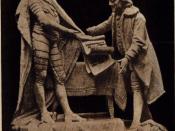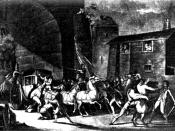1793: King Louis XVI of France guillotined in Paris. Thomas Paine's Rights of Man banned; Paine condemned in absentia (he is in France) for high treason. The British government, headed by Prime Minister Pitt, begins to arrest anyone publishing anything criticizing the government. William Godwin publishes Political Justice, a huge philosophical tract that argues Paine's case from a theoretical point of view. Godwin is not imprisoned largely because his book's price (forty times the price of Paine's) means it is not read by the wrong people. Wordsworth writes the "Letter to the Bishop of Llandaff," in which he declares himself "one of those odious people called democrats," but never publishes it (likely because he feared prosecution). 1793 also sees the passage of the Traitorous Correspondence Bill, which empowered the state to open and read the Royal Mail.
While some peasants could at least hope that they would grow enough grain to cover the money owed to their landlords and the government and provide food for their family, the urban poor-- who, if not unemployed, worked primarily in factories and shops--were dependent on the affordability and availability of pre-baked bread.
In the summer of 1787, a four-pound loaf, two of which were required daily to feed a family of four, cost eight sous. Due in large part to poor weather and low crop yields, by February 1789 the price had nearly doubled to fifteen sous. In his book Citizens: A Chronicle of the French Revolution, Simon Schama notes: "The average [daily] wage of a manual laborer was between twenty and thirty sous, of a journeyman mason at most forty. The doubling of bread prices--and of firewood--spelled destitution." Urban workers, especially those in Paris, started to protest the price of bread. When two Parisian manufacturers, Réveillon and Henriot, suggested in late...


